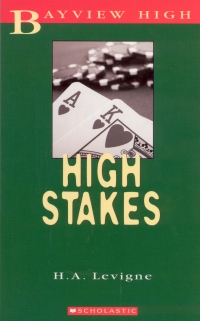| ________________
CM . . .
. Volume XIV Number 21. . . .June 13, 2008 
 |
High Stakes. (Bayview High).
H.A. Levigne.
Markham, ON: Scholastic Canada (Published by arrangement with Tea Leaf Press), 2008.
127 pp., pbk., $27.50.
ISBN 978-0-7791-7533-8.
Grades 6-10 / Ages 11-15.
Review by Andrea Galbraith.
** /4
|
| |
|

excerpt:
There was one more card left to play. Bill turned it over and laid it down on the table. Gus' stomach leaped.
It was the king of spades.
Gus tried to control his face. Now he had a perfect straight flush. Nine to king, all spades. He looked at his pile of chips and thought about his move. Carefully, he counted out ten chips. He slowly said, "One hundred dollars."
Frank didn't move a muscle. Gus watched his face for a sign of what Frank would do next, but the man was like a rock.
Then Frank said, "Call," and he, too, moved ten chips into the centre of the table.
"Okay, boys, it's the moment of truth," said Bill. "Let's see those cards."
Sixteen-year-old Gus McDonald isn't an athlete like his friend Aleksi or musical like his friend Matt, and he never knows what to say around girls. The one place he feels comfortable is at the poker table. Once he gets a chance to sit in on his father's poker game, he's hooked and quickly moves to playing secretly online. His early success goes to his head, and he begins to dig himself into a hole, losing borrowed money and even putting himself in physical danger. He refuses to recognize that he has a problem until his friends intervene, and he reluctantly agrees to get help.
This high-interest novel is part of the "Bayview High" series aimed at readers at a grade five or higher reading level. It is a fast-paced, incident-filled story written in unremarkable, but smooth, prose. Several scenes have limited dialogue as they involve Gus online at his computer, but the pace doesn't lag noticeably. The scenes describing the live poker games are well-written and compelling, while the descriptions of the online games are brief and less detailed.
Gus comes across as a very sheltered 16-year-old, one unable to talk to Jamie-Lynn, a girl he's known since grade two, and extremely unworldly. He has a computer in his bedroom, loves poker, but has never checked out online poker games until his friend, Matt, suggests he play. Matt is also a somewhat confusing character. He constantly encourages Gus to get deeper into online gambling, but then he becomes the one to confront him and call him an addict. Gus's success at online poker gives the reader the unfortunate impression that it is easy to win money in this way. Gus only comes to grief when he falls – with a level of naivete that is rather hard to swallow – for an online scam artist. The fact that he is ultimately lured into a high-stakes real life poker game suggests to the reader that online games are safe as long as you stop there.
The limited glimpses into Gus's interior world are believable. He worries about his dad's drinking, wonders how to develop his relationship with Jamie-Lynn, and admits that poker makes him feel strong and confident. However, when it comes to what drives him to keep playing online poker, he looks no further than saving money for a new computer. There is no need for him to keep playing, or start playing for high stakes. Rather than being forced in, he chooses to dive in, and while this lack of judgment can be seen as an indication of his growing gambling habit, it is still an abrupt decision for a cautious teen.
There are many characters, subplots and plot twists introduced into a short novel, perhaps more than it can support. As well as Gus's two friends, Jamie-Lynn, Gus's parents and sister, the poker dads, and the online scam artist, James, other minor characters appear. Gus's father's drinking problem emerges as an important subplot, and then almost fades out of the story before being neatly drawn into the conclusion. The resolution, though packed into a brief final chapter, shows Gus getting back on track, with the possibility of a relationship with Jamie-Lynn in the future.
High Stakes could appeal both to boys and girls and would be suitable for classroom use, as there are many plot points warranting discussion. A teacher's guide is available online from Scholastic Canada.
Recommended with reservations.
Andrea Galbraith is a student librarian and writer based in Vancouver, BC.

To comment
on this title or this review, send mail to cm@umanitoba.ca.
Copyright © the Manitoba Library Association. Reproduction for personal
use is permitted only if this copyright notice is maintained. Any
other reproduction is prohibited without permission.
NEXT REVIEW |
TABLE OF CONTENTS FOR THIS ISSUE
- June 13, 2008.
AUTHORS |
TITLES |
MEDIA REVIEWS |
PROFILES |
BACK ISSUES |
SEARCH |
CMARCHIVE |
HOME |
